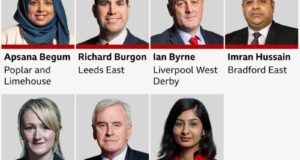British government has signalled it will not refuse the US presidential candidate Donald Trump entry to Britain following his controversial comments about Muslims, despite a petition calling for a ban gathering nearly 225,000 signatures in 24 hours.
At the height of its popularity on Wednesday afternoon, the petition, which calls for Trump to be stopped from entering Britain on the grounds of hate speech, was racking up more than 30,000 signatures an hour, according to parliament’s petitions website.
Parliament considers all petitions that receive more than 100,000 signatures for a debate. The petition to ban Trump, which became open for signatures at 4:39pm Tuesday, had been signed by 224,621 people by the same time on Wednesday.
It says: “The signatories believe Donald J Trump should be banned from UK entry. The UK has banned entry to many individuals for hate speech. The same principles should apply to everyone who wishes to enter the UK.
“If the United Kingdom is to continue applying the ‘unacceptable behaviour’ criteria to those who wish to enter its borders, it must be fairly applied to the rich as well as poor, and the weak as well as powerful.”
The petition comes after Trump was widely criticised for saying on Monday that Muslims should be banned from entering the US. He said in a speech following a mass shooting committed by a Muslim couple in San Bernardino, California, last weekend: “We need a total and complete shutdown of Muslims entering the United States while we figure out what the hell is going on. We are out of control.”
On Tuesday, there was widespread condemnation of Trump’s comments, including from fellow Republican presidential contenders. And later comments from the presidential hopeful in a radio interview that there were districts of London and Paris so “radicalised” that they were off limits to police led to further angry rebuttals from UK politicians and the police.
The London Metropolitan police said Trump “could not be more wrong”, while the mayor of London, Boris Johnson, said: “London has a proud history of tolerance and diversity and to suggest there are areas where police officers cannot go because of radicalisation is simply ridiculous.”
The UK chancellor, George Osborne, said on Wednesday it was best to combat Donald Trump through robust democratic debate and not to try to ban him from the UK on the grounds that his remarks incited racial hatred.
Speaking at prime minister’s questions, Osborne said Trump’s views “flew in the face of the founding principles of the American founding fathers”, adding that those principles had been an inspiration all round the world.
He continued: “The best way to defeat nonsense like this is to engage in robust and democratic debate, and to make it clear his views are not welcome.”
Osborne’s aides said the previous occasions when foreigners had been banned from the UK reflected moments when individuals had been repeatedly convicted of race hate crimes, and this did not apply to Trump.
A Downing Street spokesman said there were no known plans for Trump to visit the UK, so suggestions of a ban from Britain were hypothetical. He added the remarks should be seen in the context of an internal Republican election campaign.
Jon Trickett, the shadow communities secretary, praised Osborne’s remarks as clear and straightforward. He said it was “entirely inappropriate to suggest every follower of one of the world’s great religions has to be suspected of terrorism”. He added it was “wrong, divisive, dangerous and may speed up the radicalisation of individuals”.
Although he said it was interesting that 100,000 people had called for a ban, Trickett said he preferred staging a debate, rather than imposing travel bans.
The home secretary can decide to exclude a person from the UK if it is believed that an “individual’s presence in the UK would not be conducive to the public good”, according to government guidance. In effect, that usually means people seen to be preaching hate or inciting extremism. However, individuals can also be blocked on the grounds of their criminal records.
People previously banned from Britain include Mike Tyson, over his rape conviction, Dieudonné M’bala M’bala, the controversial French comedian accused of antisemitism, and Stephen Donald Black, founder of the white-supremacist website Stormfront.
The Home Office said it did not comment in individual cases.
Meanwhile, Nicola Sturgeon has moved to sever all Scottish government business links with Donald Trump. The first minister withdrew Trump’s membership of the GlobalScot business network, run by Scottish Enterprise, with immediate effect.
A Scottish government spokesperson said: “Mr Trump’s recent remarks have shown that he is no longer fit to be a business ambassador for Scotland and the first minister has decided his membership of the respected GlobalScot business network should be withdrawn with immediate effect.”
Sturgeon described Trump’s comments as “obnoxious and offensive”, and “rightly … condemned by people across the political spectrum”.
Trump was invited to join the GlobalScot network, which describes itself as a “diverse network of business leaders, entrepreneurs and executives with a connection to Scotland”, in 2006.
Meanwhile, more than 10,000 people have so far signed a petition calling for Aberdeen’s Robert Gordon University (RGU) to revoke the honorary degree awarded to Trump in 2010 in recognition of his “business acumen and entrepreneurial vision”. The decision was controversial at the time, with a former RGU principal handing back his own honorary doctorate in protest.
A RGU spokeswoman said the current principal, Ferdinand von Prondzynski, was “considering the position”, adding: “Professor von Prondzynski is totally committed to equality of opportunity and to respect for different cultures, values which are an important part of RGU’s ethos.”
Source: theguardian.com/ Updated on Wednesday 9 December 2015 17.29 GMT
0000000
 Weekly Bangla Mirror | Bangla Mirror, Bangladeshi news in UK, bangla mirror news
Weekly Bangla Mirror | Bangla Mirror, Bangladeshi news in UK, bangla mirror news








